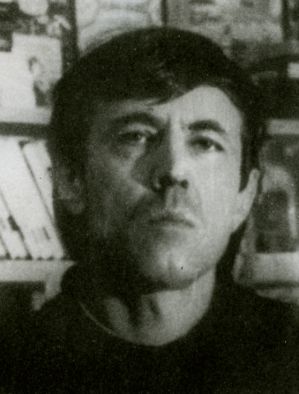Journalist, prose writer, publicist. Participant in the resistance movement of the 1970s–80s. Subjected to psychiatric persecution. Co-founder of the journal “Porohy.”
From 1968–70, after graduating from Kytaigorod secondary school, he worked as the editor of the in-house newspaper of the “Chaplynskyi” sovkhoz (state farm) in Dnipropetrovshchyna. Even from that time, his literary activities attracted the “interest” of the “competent organs.”
In 1970, he enrolled in the Faculty of Journalism at Moscow University. In 1971, he was expelled (as it later turned out, at the initiative of the Dnipropetrovsk KGB). From 1972, he worked as a staff writer for the district newspaper “Novi Rubezhi” in the village of Krynychky, Dnipropetrovsk oblast.
Vivtash’s main, foundational work, “Chernye oduvanchiki” (Black Dandelions), written in Russian, was deemed “especially dangerous” by the Dnipropetrovsk KGB and sent to Moscow for expert examination. This work was distributed in samizdat in Russia, Ukraine, and abroad (it was published only in 1992 in the Latvian independent journal “Rodnik”; Ukrainian translations of fragments appeared in the journals “Ukraina” and “Suchasnist” in 1991).
In 1975, he was dismissed from his job for materials that had a distinctly “anti-communist” and modernist content, as well as for general “nonconformism.”
In the mid-1970s, he became acquainted with the brothers Mykhailo and Bohdan HORYN, Zinoviy KRASIVSKY, Opanas ZALYVAKHA, Yaroslav LESIV, and Raisa LYSHA, and became friends with Ivan SOKULSKY. This contributed to Vivtash’s transition to writing in Ukrainian and to a more nationally conscious worldview. He experienced secret searches of his home on multiple occasions and was brutally beaten in Dnipropetrovsk (suffering fractures and a concussion). In 1977, he was subjected to psychiatric persecution for “parasitism.” Subsequently, he worked as a concrete worker in the local Tsarychanka district communal services. In 1980 and later, for many years, he was subjected to official, as well as continued unofficial, searches, during which texts, letters, documents, books, and personal belongings were confiscated. In March 1982, he was brutally beaten again. From 1983-87, he worked in a Dnipropetrovsk library.
From 1988-90, together with a group of like-minded poets and artists, he created one of Ukraine’s first independent socio-political journals, “Porohy” (edited by I. SOKULSKY), which had a significant impact in Ukraine and beyond (a collection, “Porohy,” was published in 2009 by the Smoloskyp publishing house). At the same time, he became involved in the creation of the first branches of the People’s Movement of Ukraine (Rukh) and the “Prosvita” society in Dnipropetrovsk, the first community of the Ukrainian Autocephalous Orthodox Church (UAPC), and was a member of the regional Committee for the Salvation of the Dnipro and Prydniprovia. In 1988, along with Raisa LYSHA, he participated several times in meetings of the Ukrainian Culturological Club in Kyiv.
Since 1991, he has been published in the newspapers “Literaturna Ukraina” and “Ukrainske Slovo,” with articles in the journals “Obrazotvorche Mystetstvo,” “Artaniia,” and “Dzvin.”
Since 1992, he has lived in Kyiv. From 1993-99, he worked as a member of the editorial board and designed the all-Ukrainian Orthodox newspaper “Nasha Vira” (editor-in-chief Yevhen SVERSTIUK). Since the early 1990s, he has communicated and maintained creative ties with members of the New York Group of poets (Boychuk, Tarnawsky, et al.) and published works in the journal “Svito-vyd” (Kyiv-New York).
Overall, Vivtash’s work is based on a modernist-Christian worldview somewhat atypical for traditional Ukrainian culture, with a noticeable influence of existentialism, at times with a radically avant-garde and religious form of expression (influenced by Kierkegaard, Sartre, Heidegger, Camus, German mystics, Buddhism), and the discourse of surrealism and “counterculture.”
A certain part of Vivtash’s work remains unclaimed even in the conditions of independence and “democratic pluralism” (partially the Russian-language works), as does his persona itself, which is “overshadowed” and unnoticed, existing outside the “canons,” “schools,” “iconostases,” and “formats.”
Bibliography:
Selection of poems // *Suchasnist*. New York, 1990 and 1991.
*Chernye oduvanchiki*. Prose // *Rodnik* journal, Part 6, Riga, 1992.
*Navzdohin za potiahom*. Memoir. Selection of poems and prose // *Svito-vyd*. Part 4, Kyiv — New York, 1992.
*Introspektsii. Smert Kierkehora* [Introspections. The Death of Kierkegaard] // *Kurier Kryvbasu*. Part 7, Kryvyi Rih, 1997.
*Khto u sviti pershyi? Shtrykhy do portreta ostannoho romantyka* [Who is First in the World? Sketches for a Portrait of the Last Romantic] // *Chas-time* newspaper. – 1997. – July 17-23. – p.10.
*“Hordist rozumu”, abo koronatsiia peremozhenoho. Lysty poeta z nevoli na “velyku voliu”, prochytani v chasy pryyshestia khaosu* [“The Pride of Reason,” or the Coronation of the Defeated. Letters of a Poet from Captivity to the “Great Freedom,” Read in the Time of the Advent of Chaos] // Ivan Sokulsky. *Lysty do Mariiechky: Vybrane lystuvannia (1981—1987)* [Letters to Mariechka: Selected Correspondence (1981–1987)]. Ed. O. Sokulska. — Dnipropetrovsk: Sich, 2000. – pp. 82-85; Same: K.: Smoloskyp, 2000. – pp. 81-84
*Rekonstruktsiia maibutnoho*. Foreword to the collection *Porohy. Vybrane*. Dnipropetrovsk, 1988-90. Parts 1-9. — “Smoloskyp,” Kyiv, 2009. – pp. 21-27.
Publicistic, literary, and artistic works (collages, photographs): “Porohy” journal, 1988-90, Dnipropetrovsk.
Publicism: “Nasha Vira” newspaper, Kyiv, 1991-2006.
Raisa Lysha (prepared by V. Ovsiienko, Kharkiv Human Rights Protection Group, July 28, 2009).
